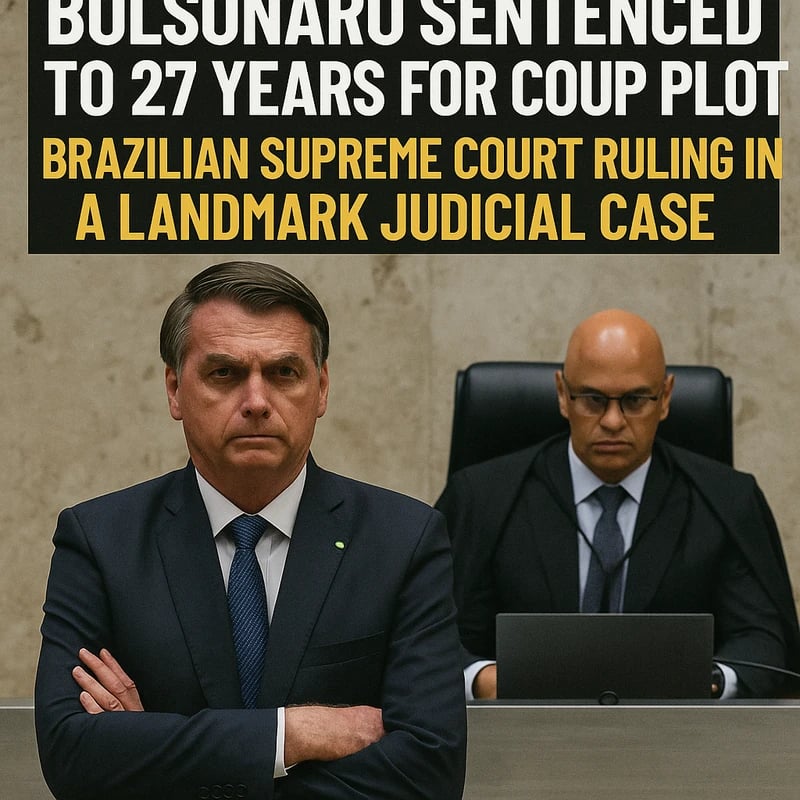Bolsonaro sentenced to 27 years for coup plot signals a milestone for Brazil. Learn charges, appeals path, and what this means for democracy today.
Quick Answer
Brazil’s Supreme Court has sentenced former President Jair Bolsonaro to 27 years and three months in prison for a coup plot tied to overturning the 2022 election. The five-count conviction includes organizing a coup and leading a criminal organization; Bolsonaro denies guilt. He remains under house arrest as he appeals, marking a historic moment for Brazil’s democracy and its institutions.
Key Takeaway: Bolsonaro sentenced to 27 years for coup plot represents a landmark ruling that could reshape Brazil’s political landscape as the appeals unfold.
Complete Guide to Bolsonaro sentenced to 27 years for coup plot
This section lays out a clear, source-backed explainer: the timeline, the charges, the implications for Brazilian democracy, and where things go next. Throughout, you’ll see the primary keyword, related terms, and scenarios explained with data points and context.
When did Bolsonaro’s conviction occur?
Bolsonaro’s conviction was announced on September 11, 2025, by Brazil’s Supreme Court after a high-profile five-count trial. The verdict capped a months-long investigation into an alleged plan to disrupt the 2022 electoral outcome. The panel’s decision is being described by observers as a watershed moment for Brazil’s democratic framework. Experts note the ruling signals a robust stance by the judiciary against attempts to undermine electoral legitimacy.
Key Takeaway: The Sept. 11, 2025 verdict anchors the ongoing debate about the durability of Brazil’s constitutional order under pressure from political turbulence.
Why Bolsonaro was sentenced to 27 years?
The 27-year term arises from the cumulative penalties across five counts, centered on organizing a coup and leading a criminal organization. Prosecutors argued that Bolsonaro orchestrated and coordinated a faction within the armed and civil sectors to destabilize the electoral result, while supporters framed the actions as protecting constitutional rights. The sentence reflects both the severity of the alleged acts and the court’s attempt to deter future attempts to subvert elections.
Key Takeaway: The 27-year figure embodies a multi-count finding that blends alleged coup-planning with criminal organization leadership.
What charges were Bolsonaro convicted of?
In total, five counts formed the backbone of the conviction. They include:
- Organizing a coup attempt aimed at overturning the 2022 election result.
- Leading a criminal organization tied to the alleged plot.
- Conspiracy and incitement elements linked to mobilizing supporters around the effort.
- Abetting or facilitating actions intended to undermine the constitutional process.
- Additional related charges tied to obstructing democratic institutions.
Bolsonaro denies guilt, arguing the charges are politically motivated or misinterpreted. The court’s formal documentation details the precise factual predicates, but the public framing centers on coup-plotting and leadership of a criminal network.

Key Takeaway: The five-count conviction encompasses both coup-plot actions and leadership of an organized network, not just isolated incidents.
What does Bolsonaro’s 27-year sentence mean for Brazil’s democracy?
This ruling is widely described as a watershed moment for Brazil’s democratic system. Proponents say it reinforces checks and balances, showing that even a former head of state is accountable under the law. Critics warn that heavy sentences could inflame political tensions if perceived as punitive against political adversaries rather than a neutral enforcement of justice. For regional observers, the decision is watched as a signal about how Brazil will handle future political crises.
Data points and trends:
- The ruling follows a sequence of high-profile judicial actions aimed at stabilizing institutions after years of turbulence.
- Domestic reactions include calls for measured debate and respect for rule of law from a broad cross-section of civil society.
- International reactions range from cautious statements about upholding constitutional processes to strategic recalibrations in diplomacy.
Key Takeaway: The verdict reinforces rule-of-law norms in Brazil, with wide domestic and international implications for democratic standards in Latin America.
Will Bolsonaro appeal the ruling?
Yes. Bolsonaro is expected to appeal the decision, a process that could stretch over months or years. Appeals are common in Brazil’s judiciary in high-profile political cases, and the case will likely move through multiple court levels before any final resolution. The appeal process will also influence public perceptions about the strength and independence of Brazilian institutions during a fraught period.
Key Takeaway: A prolonged appeal means the legal and political status quo remains in flux for now, keeping public attention and institutional scrutiny high.
What is Bolsonaro’s current legal status after the ruling?
Bolsonaro remains under house arrest as the appeals proceed. He is restricted from certain activities and movements while the higher courts review the verdict. This status highlights the judiciary’s transitional role: enforcing penalties when warranted, while allowing for due process through appeals.
Key Takeaway: House arrest keeps Bolsonaro in a controlled legal frame while the appellate process plays out, illustrating Brazil’s emphasis on process within political-criminal cases.
How did the international community react to Bolsonaro’s sentence?
Initial international reactions were swift and pointed. Reports indicate that figures like the U.S. administration condemned the verdict in strong terms, framing it as a test of Brazil’s democratic resilience. The response underscores how regional stability and transatlantic ties can be influenced by high-profile judicial outcomes, especially when leaders on the world stage are involved in coups or constitution-defying activities.
Data points and trends:
- Official voices stressed upholding constitutional processes and the rule of law.
- Economic-lodgment signals (like policy or tariff considerations) were speculated in some circles about potential shifts, though specifics varied by actor.
- Regional reactions focused on Brazil’s example as a bellwether for Latin American democratic governance.
Key Takeaway: The international reaction frames the Bolsonaro sentence as not only a national affair but a regional and global signal about the strength of Brazil’s democratic institutions.
What is the background on the coup plot and five-count conviction?
The case centers on an alleged attempt to overturn the 2022 election results and to mobilize a faction within Brazil to undermine the electoral process. Authorities described a coordinated set of actions that could destabilize constitutional order. The five-count conviction formalizes these allegations in a legal framework designed to deter similar efforts in the future and to reassure both domestic and international audiences about the durability of Brazil’s electoral system.
Data points and trends:
- The alleged plot triggered a court process that led to a landmark five-count conviction.
- The charges reflect a blend of organizational leadership, conspiracy, and attempts to disrupt elections.
- The ruling is framed by observers as a decisive moment in Brazil’s ongoing struggle to maintain robust, independent institutions.
Key Takeaway: The background episode is central to understanding why the sentence is so consequential for Brazil’s institutional integrity.
Could this decision affect regional politics in Latin America?
Analysts expect the Bolsonaro verdict to influence regional conversations about democracy, accountability, and the role of courts in disputes between political factions. While domestic actors interpret the ruling through varied lenses, other Latin American countries may view it as a benchmark in how courts can address perceived threats to constitutional order. The long-term regional impact will depend on subsequent actions by Bolsonaro’s camp, opposition groups, and Brazil’s judiciary.
Key Takeaway: The decision could set a regional precedent for judicial accountability in political crises, shaping how neighboring democracies approach similar challenges.
What are the potential political implications for Bolsonaro’s allies?
Allies and supporters face a mixed landscape: some may push for amnesty or leniency as a political strategy, while others advocate continuing legal challenges or public mobilization. The ruling complicates ally alignment, as factions weigh loyalty to Bolsonaro against the risk of further legal exposure. Political calculations in the wake of the sentence will likely drive new alliances and messaging strategies.
Key Takeaway: Bolsonaro’s associates are navigating a complex legal-political terrain where loyalty, protest, and policy positions intersect with ongoing legal processes.
How does this case fit into Brazil’s broader history of judicial action against political figures?
Historically, Brazil’s judiciary has played a central role in mediating political disputes, sometimes leading to controversial outcomes. This case sits within a longer arc of court-led accountability for political actors, signaling a possible shift toward stricter enforcement of electoral norms. Critics may fear politicization, while supporters argue the judiciary is upholding constitutional guarantees under pressure from powerful actors.
Key Takeaway: The case reinforces Brazil’s ongoing experiment with judicial accountability as a cornerstone of democratic resilience.
What are the next steps in the legal process?
Beyond the immediate appeals, analysts anticipate a sequence of court reviews, possible retrials on specific charges, and continued monitoring of Bolsonaro’s status under house arrest. The timeline remains uncertain, but the appellate route is expected to define how quickly or slowly the legal narrative moves toward a final verdict. Public accountability and transparency will be central themes as events unfold.
Key Takeaway: The legal pathway ahead is a multi-stage process that will shape both judicial credibility and political stability in Brazil.
Practical Applications and Expert Insights
- Practical takeaway for policymakers and observers: Focus on how Brazil preserves independent judicial review under high political pressure, ensuring due process while safeguarding electoral legitimacy.
- Expert insight (contextual): Legal scholars emphasize that high-profile coup-plot cases test constitutional courts’ authority and their ability to impartially adjudicate politically charged scenarios.
- Data anchor: The 27-year sentence and five-count conviction provide concrete benchmarks for future discourse on accountability and rule of law in Brazil.
Related topics for further exploration (internal linking ideas): Brazilian judiciary, Brazilian democracy, Brazil elections, coup plots in Latin America, rule of law in Brazil, regional political stability, international reactions to Brazilian politics.
Key Takeaway: This section connects the verdict to broader governance challenges in Brazil and Latin America, offering guiding questions for readers tracking institutional resilience.
Why This Matters
In the wake of the Bolsonaro sentence, the long-term implications for Brazil’s political fabric are being debated across boardrooms, universities, and town halls. The ruling is not just a legal milestone; it’s a signal about how democratic norms hold up when a former head of state faces criminal charges tied to the electoral process. Over the last three months, markets, civil society, and international partners have watched closely as Brazil navigates this moment of institutional stress.
- The verdict underscores the seriousness with which Brazil’s judiciary treats threats to electoral integrity, reinforcing checks and balances at a moment of political volatility.
- Domestic actors on both sides are recalibrating strategies: pro-democracy coalitions emphasize accountability, while some allied groups debate broader amnesty or political concessions.
- Internationally, the decision reverberates beyond Brazil’s borders, affecting regional diplomacy and economic relationships as partners reassess risk and stability.
Key Takeaway: The Bolsonaro sentence is a defining moment for Brazil’s democracy, with ripple effects in politics, markets, and international engagement for months to come.
People Also Ask
The following questions mirror common searches people use to understand this topic. Each answer is concise and designed to stand alone, with the nuance you’d expect from a comprehensive explainer.
Why was Jair Bolsonaro sentenced to 27 years?
The sentence results from a five-count conviction that prosecutors described as orchestrating a coup attempt and leading a criminal organization linked to efforts to overturn the 2022 election. The severity of the charges and the perceived threat to democratic order drive the 27-year total.
Key Takeaway: The 27-year sentence reflects multiple, interconnected charges centered on coup planning and leadership.
What charges were Bolsonaro convicted of?
Bolsonaro was convicted on five counts, including organizing a coup, leading a criminal organization, conspiracy related to undermining the electoral process, incitement, and facilitating actions intended to disrupt constitutional order.
Key Takeaway: The conviction rests on a structured set of related offenses, not a single act.
What does Bolsonaro’s 27-year sentence mean for Brazil’s democracy?
Experts see it as a milestone for institutional accountability, intended to deter future attempts to subvert elections. It signals a strong stance by the judiciary toward protecting constitutional processes, which could stabilize Brazil’s democratic order—at least in the near term.
Key Takeaway: The ruling reinforces democratic norms but may provoke intense domestic debate as appeals unfold.
Will Bolsonaro appeal the ruling?
Yes. The appeals process is standard in Brazil for high-profile political cases and will likely be lengthy, with the outcome uncertain until all levels of the judiciary weigh in.
Key Takeaway: The legal saga isn’t over; the appellate path will shape both judicial legitimacy and political dynamics.
What is Bolsonaro’s current legal status after the ruling?
He is under house arrest while appeals proceed. The restriction is part of the judicial order, preventing certain freedoms until a final verdict is reached.
Key Takeaway: House arrest keeps Bolsonaro legally constrained as the case continues through the courts.
How did the international community react to Bolsonaro’s sentence?
Initial responses included condemnation from some international actors emphasizing respect for constitutional processes and the rule of law. In certain quarters, discussions of how this affects regional stability and Brazil’s diplomatic stance emerged as key themes.
Key Takeaway: The global reaction frames the verdict as a test of Brazil’s commitment to democratic norms beyond its borders.
When did Bolsonaro’s conviction occur?
The conviction was delivered on September 11, 2025, by Brazil’s Supreme Court, marking a turning point in how the country handles political-criminal cases involving former leaders.
Key Takeaway: The exact date anchors the narrative and sets the pace for ensuing legal actions and political reactions.
How did this case fit into Brazil’s recent history of political accountability?
This verdict fits a broader pattern of judicial action against political figures in Brazil, reinforcing the role of the judiciary as a guardian of electoral legitimacy. While it strengthens accountability, it also heightens sensitivity around perceived political motives and the boundaries of legal enforcement in politically charged contexts.
Key Takeaway: The case is part of an evolving narrative about judicial independence and accountability in Brazil.
What are the potential domestic consequences in the short term?
Expect continued public debate, potential protests, and strategic repositioning by political groups on all sides. The immediate future hinges on the appeals process and how authorities manage social peace while enforcing the ruling.
Key Takeaway: The short-term horizon will be defined by how the public responds and how effectively institutions maintain order during the legal process.
Next Steps
- Follow the appellate timeline: monitor how the judiciary handles Bolsonaro’s appeal, including potential retrials or further reviews.
- Track domestic discourse: observe how political parties, civil society, and media frame the ruling in the weeks ahead.
- Watch international reactions: note shifts in diplomacy or economic signaling as countries calibrate their stance on Brazil’s evolving democracy.
- Internal linking ideas: Brazilian judiciary reforms, electoral integrity, Latin American democracy, Brazil-U.S. relations, political accountability in Brazil, case studies on coup plots in the region.
Key Takeaway: The road ahead is defined by procedural steps in the courts and the political and public responses they provoke, shaping Brazil’s democratic trajectory.
If you’re following this story for a project, an analysis video, or just staying informed, the Bolsonaro 27-year sentence narrative is a prime example of how constitutional law, politics, and international relations intersect in real time. The situation will continue to evolve as appeals unfold, and the world watches how Brazil defends its democratic institutions under pressure.
Related topics to explore for deeper understanding: Brazil’s electoral process, the role of the Supreme Court in political cases, the history of political prosecutions in Latin America, Brazil’s constitution and civil liberties, international law and sovereignty in domestic political disputes, regional responses to governance challenges.



